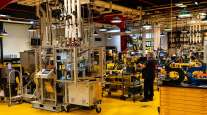Trucking’s Recovery Is Sound, Likely to Last, Economists Say
This story appears in the May 14 print edition of Transport Topics.
SAN FRANCISCO — Two of trucking’s leading economists said last week the industry’s economic recovery was well under way and should continue for at least several more years.
The pair — Bob Costello, chief economist of American Trucking Associations, and Noël Perry of Transportation Fundamentals Inc. — told attendees of the National Tank Truck Carriers annual meeting that trucking has been outperforming the economy as a whole as manufacturing has led the nation out of recession.
But both prognosticators urged fleet executives to keep an eye on costs, as a substantial driver shortage is building, fuel remains relatively expensive and equipment prices continue to rise.
Both said conditions in the marketplace were far better than many financial commentators and politicians have said.
“Stop complaining,” Perry told the audience here on May 7. “This is a pretty good market.” He said the current recovery was very similar to what occurred in 2004 after the previous recession and that most fleet executives had been happy with those results.
The growth in domestic manufacturing has boosted trucking over the past 18 months, Perry said. Now, trucking will benefit as the housing market finally gets back on its feet, because the oversupply of unsold homes has been removed and new building activity will expand.
Housing construction should boost truck freight by 3% to 4% a year for the next few years, Perry predicted.
In general, he said, business should remain strong at least until 2014 or 2015 but that another recession could be lurking after that, driven at least in part by sharply rising taxes that he expects Congress will implement eventually to cover the huge budget deficits the nation has been running.
Costello told the tank truck operators not to worry about upcoming reports on how gross domestic product was growing but to focus on the steady, if unspectacular, overall business growth.
He said large truckload carriers were doing well, and most were expanding their capacity slowly.
Costello said he expected truck tonnage to grow between 3% and 4% this year throughout the industry.
Smaller carriers, however, were not growing, he warned. Overall, small truckload fleets actually shrank about 3% from March 2011 to this March.
These smaller fleets also are facing some daunting hurdles, led by the rapidly escalating cost of new trucks, which Costello said was replacing fuel as that sector’s biggest concern.
Costello said that not only have new-truck prices grown from less than $100,000 for a new tractor to $125,000, but the equipment fleets are trading in is older than usual because most carriers delayed purchases during the recession.
As a result, fleets must finance more of their equipment purchases, which could jeopardize smaller fleets with weaker cash flows.
“This equipment situation is the new fuel for smaller carriers,” Costello said,
On the positive side, he said he was optimistic that U.S. manufacturing was beginning a new period of strength as labor costs have declined as a proportion of the total cost of goods production, which would be very positive for trucking.
He said truck supply and freight demand were in sync at present, which was allowing carriers to improve their performances. But he warned that if the economic recovery gains strength, capacity shortages could develop quickly.
Perry said trucking could well be 500,000 drivers short in 2013 if all the proposed federal regulatory changes that have been proposed actually are implemented.
The driver shortage will be exacerbated by the declining number of young people who are entering the U.S. labor market as birth rates decline, he said.
Perry and Costello agreed that driver compensation costs were sure to rise for fleets as a result of the growing shortage.
Costello added that driver costs are rising already, but he told the audience that such costs to fleets actually have declined about 10.5% over the past 20 years.
Driver turnover rates also are rising after declining sharply during the recession, Costello said.
Overall, Perry said, truckload fleet costs are likely to increase at about 6% a year from 2012 through 2014, twice the growth rate from 2007 through 2011 but half of what it was from 2003 through 2006.
Fuel prices remain a major concern for fleets, the economists agreed, although the growing use of natural gas is holding U.S. fuel costs down, Perry said.
He said fuel taxes are likely to rise when Congress gets around to paying for the deficits caused by the spread of federal expenditures and receipts.
He blamed the deficits on the “dysfunctional politicians we keep electing,” who refuse to reconcile the national demand for such programs as Social Security and defense with the need to raise the revenue needed to pay for them.
In all, Costello said, the U.S. trucking industry spent about $143 billion on fuel last year.




